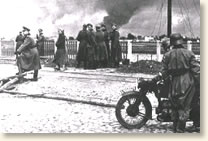
Service for 'forgotten' evacuees
 Evacuee Pat Fawcett with the teddy bear she took with her as a child
Evacuee Pat Fawcett with the teddy bear she took with her as a childA commemorative service has been held at London's St Paul's Cathedral to mark the 70th anniversary of the evacuation of British citizens in World War II.
The first wave, known as Operation Pied Piper, involved 1.5m people and took place over four days from 1 September 1939, when hostilities began in Europe.
Around 3.5m people, mainly children, were removed from cities and towns to safer areas from 1939 to 1945.
Organiser James Roffey said: "We were the forgotten ones of the war."
The Evacuees Reunion Association organised the event, which was attended by 2,000 people.
During the service of thanksgiving, a book of remembrance was taken to the altar and former evacuees shared their stories.
But a flypast by an RAF Lancaster bomber had to be cancelled because of high winds.
'Punch-ups'
Of the 1.5m citizens evacuated as part of Operation Pied Piper, 750,000 were children on their own.
A year later, just before the Blitz, an estimated 600,000 children were removed from the areas deemed to be most at risk from enemy bombing. (BBC here)
There is an old cliche: Those who forget history are bound to repeat it. Like most cliches, there is more than a grain of truth in those words.
I *could* get political, and remind certain politicans about the perils of appeasement. Instead I choose to focus on all those who recognised the dangers of unchecked terrorism. I choose today to honour all the brave men and women - in all the allied countries, who answered the call and served to defeat tyranny.
1939: Germany invades PolandGerman forces have invaded Poland and its planes have bombed Polish cities, including the capital, Warsaw.The attack comes without any warning or declaration of war.
Britain and France have mobilised their forces and are preparing to wage war on Germany for the second time this century.
Just before dawn today, German tanks, infantry and cavalry penetrated Polish territory on several fronts with five armies, a total of 1.5 million troops. ...
...
Britain and France were forced to declare war after Germany ignored their separate ultimatums, delivered on 3 September 1939, demanding the withdrawal of German troops from Poland.In the mid-1930s, Britain's response to the acceleration of Germany's rearmament and the threat of war was to appease rather than confront Hitler and his generals.
By late 1938, Hitler was making speeches that furiously proclaimed Germany's right to annex the Sudetenland, a Czechoslovak territory with a significant German population.
Chamberlain flew to Germany to calm the situation, eventually signing the Munich Agreement with Hitler, giving control of the Sudetenland to Nazi Germany.
With the invasion of the rest of Czechoslovakia in March 1939, Britain was no longer acquiescent and Chamberlain warned that any further attacks would meet resistance. It took the defeat of Poland six months later to induce the British and French governments to declare war....(here)
On September 1, 1939 German troops swarmed across the Polish border and unleashed the first Blitzkrieg the world had seen. Hitler had been planning his attack since March - ever since German troops occupied the remainder of Czechoslovakia. The Poles suspected as much and readied their defenses. Unfortunately the Poles based their defensive strategy on the experiences of World War I. Mobility was crucial - mobility provided by cavalry troops the Poles considered the best in the world. Indeed, their horsemen were probably the world's best - but horses offered little defense against tanks.
German troops at the outskirts
of Warsaw watch the city burn
September 1939Britain and France had sworn to defend Poland. Honoring these obligations, the two countries sent ultimatums to Hitler demanding his withdrawal from Poland. Hitler declined to respond. (see The Beginning of World War II, 1939) On September 3, Prime Minister Chamberlain went to the airwaves to announce to the British people that a state of war existed between their country and Germany. World War II had begun.
Unfortunately Chamberlain's action was little help to the Poles. German troops advanced steadily. The final blow came on September 17 when Soviet forces under terms of a secret agreement with Germany marched into Poland from the East. Warsaw surrendered on September 27. By October 6, it was all over. Poland had ceased to exist as a country...(here)
Allied ww2 casualties
| Country | Military casualties | Civilian casualties |
| British Empire and Commonwealth | 452.000 | 60.000 |
| France | 250.000 | 360.000 |
| USA | 295.000 | --- |
| Soviet Union | 13.600.000 | 7.700.000 |
| Belgium | 10.000 | 90.000 |
| Holland | 10.000 | 190.000 |
| Norway | 10.000 | n/a |
| Poland | 120.000 | 5.300.000 |
| Greece | 20.000 | 80.000 |
| Yugoslavia | 300.000 | 1.300.000 |
| Chekoslovaquia | 20.000 | 330.000 |
| China | 3.500.000 | 10.000.000 |
Let US not forget history.
(For background on Vera Lynn, go here)
For my Sgt Major Ken. I carry you with me, with love.


















2 comments:
Well done, Brat! Since history as it occurred is no longer being taught in our schools, I fear we will find ourselves repeating a lot of the same mistakes made in our past. Humans seem stubborn that way, don't they.
Actually there were 6 US casualties during WW 2 (in the 48 States). This was due to a Japanese Fire Balloon.
Not many people know about these weapons, but it showed the desperation that Japan faced fighting the Americans.
WW 2 was a horrible war. Millions suffered & died for no reason but the vanity of evil.
Post a Comment